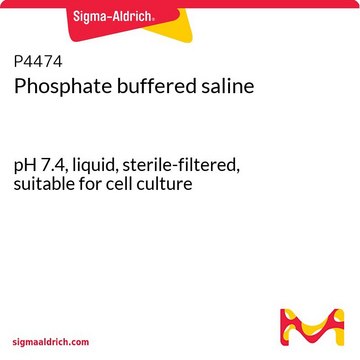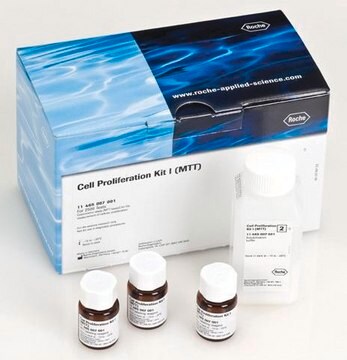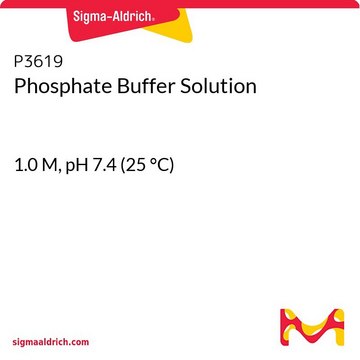806552
Phosphate Buffered Saline
pH 7.4, liquid, sterile-filtered, suitable for cell culture
Synonym(s):
Phosphate buffered saline, PBS
About This Item
Recommended Products
sterility
sterile-filtered
form
liquid
technique(s)
cell culture | mammalian: suitable
impurities
Endotoxin, tested
pH
7.4
Looking for similar products? Visit Product Comparison Guide
General description
Application
- as a reagent in the isolation of human endometrial stem cell/stromal cells (hEnSCs) from the endometrium or menstrual blood
- has also been used to wash cells during immunofluorescence staining
- as a solvent for the glucose administered orally in the Glucose Tolerance Tests (GTTs)
Storage Class Code
12 - Non Combustible Liquids
WGK
nwg
Flash Point(F)
Not applicable
Flash Point(C)
Not applicable
Certificates of Analysis (COA)
Search for Certificates of Analysis (COA) by entering the products Lot/Batch Number. Lot and Batch Numbers can be found on a product’s label following the words ‘Lot’ or ‘Batch’.
Already Own This Product?
Find documentation for the products that you have recently purchased in the Document Library.
Customers Also Viewed
Articles
Millicell® hanging cell culture inserts for staining and microscopic analysis directly from the insert. Learn to utilize hanging cell culture inserts in barrier measurements.
Protocols
WST-1 assay protocol for measuring cell viability, proliferation, activation and cytotoxicity. Instructions for WST-1 reagent preparation and examples of applications. Frequently asked questions and troubleshooting guide for WST-1 assay.
MTT assay protocol for measuring cell viability, proliferation and cytotoxicity. Instructions for MTT reagent preparation and examples of applications.
Protocol Guide: XTT Assay for Cell Viability and Proliferation
Learn how to perform cell migration assays in vitro using Millicell® hanging cell culture inserts and the suspension T-cell lines Jurkat and primary CD4+ cells. Monitor migration by flow cytometry and EZ-MTT assays.
Our team of scientists has experience in all areas of research including Life Science, Material Science, Chemical Synthesis, Chromatography, Analytical and many others.
Contact Technical Service










